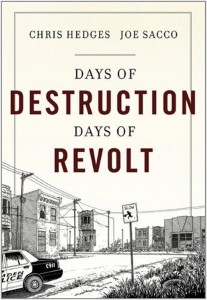BOOK REVIEWS: Days of Destruction, Days of Revolt and The Militarization of Indian Country
by Julie Billingsley, Webster University – Saint Louis
Human rights are intended to be universal, unalienable, and self-evident. If human rights are universal, then a state has a duty to protect them for all its citizens. Many people question whether the United States is a violator of these tenets of human rights or if it, as a sovereign nation, just interprets its responsibility to protect differently – particularly when it comes to minority groups that often, advocates argue, face dehumanization and marginalization. Recent books by two authors, Winona LaDuke and Chris Hedges, analyze some past and ongoing actions of the U.S. government in relation to minority populations. These authors have different writing styles, but their works are critical for gaining a realistic perspective about a country that is often perceived as being the greatest protector of human rights in the world.
Winona LaDuke, an Ojibwe, is an internationally recognized advocate and leader for sustainability and Native American interests. She is the author of multiple books, editorials, and essays about the impact and importance of resilience and resource efficiency though sustainable development, renewable energy, and food systems. A former Green Party vice-presidential candidate who ran for office with Ralph Nader, LaDuke is currently the Executive Director of Honor the Earth, an organization devoted to increasing awareness of environmental issues. She also founded the White Earth Land Recovery Project, an organization focused on continuing the culture of protection and cultivation of native traditions.
LaDuke’s recent book, The Militarization of Indian Country, is a direct and fascinating account of how the U.S. military has, in some cases, trampled the rights of indigenous peoples – particularly when it comes to land rights. Heavy with case study data, LaDuke demonstrates the character of a powerful government and military that has negatively impacted the lives of Native Americans. While each chapter focuses on a different aspect of life and culture, every page offers an indigenous perspective on human rights protection in the United States. This encourages the reader to skeptically view actions that advance American exceptionalism, particularly when it comes to human rights.
Chris Hedges is an author, columnist, and activist. He served as a foreign correspondent for National Public Radio, The New York Times, and other media outlets for almost two decades. He has received many awards, including the Amnesty International Global Award for Human Rights Journalism. He speaks multiple languages and isn’t known to abstain from provocative topics relating to international relations. He currently writes weekly for a popular progressive online news source, Truthdig, as well as periodically writing for other publications like The New York Review of Books and Harper’s Magazine.
Written by Hedges and partially illustrated by Joe Sacco, Days of Destruction, Days of Revolt evokes a visceral reaction as you are taken into the daily lives and frustrating circumstances of people in fractured cities throughout the U.S. This book demands a critical look at the recent past and sobering current impacts of the government, as well as the consequences of corporate actions that dismantle, destroy, and eradicate the ability of many citizens to live a life of dignity. Evidence of how the environment is ravaged by corporations – allowed and sometimes even encouraged by the U.S. government – adds to the book’s critical perspective, which questions the U.S.’s position as an authority on human rights.
Both authors provide important information that highlights human rights violations within the United States. LaDuke provides a history of strategic and intentional actions by the military-industrial complex that clearly represent indisputable violations of the rights of Native Americans, for instance, even for readers without extensive knowledge of human rights law. Hedges ensnares you by outlining how the U.S. government has refused to act when corporations mutilate communities and the environment. Both books force the reader to wonder why the government has allowed various social forces – the military, corporations, capitalism, and the elite – to be in control and to violate fundamental rights. Morality, virtue, and empathy are poked and prodded, begging the simple question: Why does this happen? To address this, LaDuke uses some narrative but focuses on providing extensive facts to support her argument; she convincingly illustrates a loss of vital rights such as those of self-determination, cultural life, community, life, liberty, personal security, property, free movement, and freedom from discrimination and degrading treatment. Hedges provides case studies with a personal voice. Instead of laying out the facts of an argument like LaDuke does, Hedges envelopes the reader in the lives of people who – we realize as we read the book – could be us. LaDuke’s evidence is sound and thought-provoking, but it is harder to imagine what these events were like for those living them.
With page after page of short examples to illustrate the U.S. government’s misuse of sovereignty and rights violations, reading The Militarization of Indian Country can be daunting. It is a paradox. The text is clear and readable and yet the reader may find that it demands reading breaks. For example, a section on land includes discussions ranging from: the impact of toxic chemicals and nuclear waste on the earth, seizing lands through eminent domain, the origin of Fort as a prefix for many reservations, and so on – this makes these 42 pages feel crowded like a reference book. LaDuke’s information is backed up with numerous citations and an extensive “Learn More About” section. The information covered in this book is need-to-know and it certainly comes with an activist agenda; because it is about a culturally, politically, and geographically marginalized group in the United States, the opposition isn’t given (and actually doesn’t need, in my opinion) equal time. LaDuke argues that the justification of government actions are taught in American primary and secondary schools with the strong sense of American exceptionalism and the expectation of acceptance. The raw facts LaDuke presents lead to a comparison of this book to those that start with phrases such as “What Your History Teacher Never Told you About…”
Hedges provides a narrative of five cities that reverberates in your mind and links the reader to the people whose stories are told within these pages. In “Days of Theft,” which represents the reservation of Pine Ridge, South Dakota, we are immediately confronted with the community’s great sadness through a variety of quotes from community members, authors, and activists. In the same section, potent drawings by Joe Sacco make you forget for a moment that you intended to continue reading. Many of Sacco’s drawings throughout the book – such as an image of passed-out, drunken men – is located among dynamic text that illustrate native issues and human rights concerns. It is a heart wrenching introduction to a style of writing that draws you in like a page-turner of a novel.
Hedges writing shows the structural violence that has decimated the cultures and lives of those living in Pine Ridge and other featured locations, but in a different way than LaDuke. LaDuke is the expert and Hedges is the observer, the journalist. LaDuke reminds us that these lessons must not be forgotten – but in many cases they have. LaDuke wants the truth out there. Hedges wants you to find the truth, to feel it, to connect with and own some of the sadness and despair of these real people. Hedges does not parse words and is clear throughout the book that there is someone to blame: “The poison pouring out of these little shrines of death and profit [reservations], erected by white capitalists, greases old, familiar cogs” (p. 4). While LaDuke presents the facts, she seems to hold throughout that change is possible; with knowledge of past and present to guide us in respect, action, and policymaking, change is complicated but still an option. Hedge’s book is darker, more defeated. It represents some people as lost, and the reader almost feels as if there is nothing we can do for them.
Human rights advocates, activists, and armchair philosophers will benefit from reading both books. For the rights of the people to be protected, LaDuke effectively focuses on the power of the U.S. military and politicians to change the course of the nation – not just for Native Americans, but also for the environment and the rights of all citizens. At Occupy Wall Street, Hedges closes with an invocation of the spirit of renewal and community, hope and empowerment, reminding us that we have power, too. In contrast to LaDuke, Hedges keeps capitalism and the government in the role of oppressor and demands change through revolution. In search of the man behind America’s curtain, much like the Wizard of Oz, LaDuke and Hedges succeed in revealing to the reader what we never knew and may never have thought to look for. In search of the American experience, each book uniquely describes suffering and loss of self-determination. In search of a call to action, both are loud and clear in reminding readers to stay vigilant in demanding those universal, unalienable, and self-evident rights.
Book Information
Days of Destruction, Days of Revolt
Chris Hedges and Joe Sacco (2012)
291 pp, Nation Books $28
The Militarization of Indian Country
Winona LaDuke (2013) with Sean Aaron Cruz
92 pp, Makwa Enewed/Michigan State University Press $16.95
© Copyright 2014 Righting Wrongs: A Journal of Human Rights. All rights reserved.
Righting Wrongs: A Journal of Human Rights is an academic journal that provides space for undergraduate students to explore human rights issues, challenge current actions and frameworks, and engage in problem-solving aimed at tackling some of the world’s most pressing issues. This open-access journal is available online at www.webster.edu/rightingwrongs.



 Posted under:
Posted under: 
